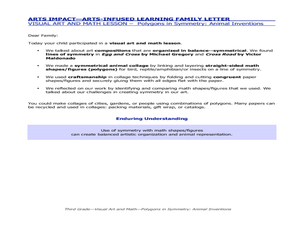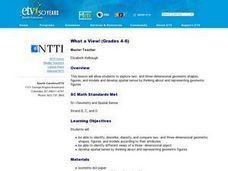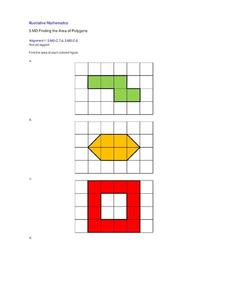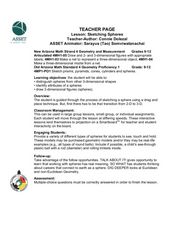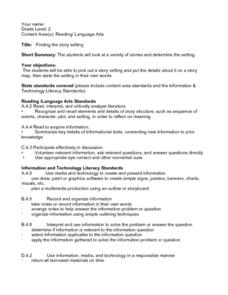Curated OER
Our Friends b and d
Students practice a variety of techniques and strategies to assess the differences between the lowercase letters b and d. They listen to and identify the letters b and d in the book, "Bud the Sub," and then play a game to master this skill.
Alabama Learning Exchange
Polygons-Changing Area Versus Changing Perimeter
Investigate the area and perimeter of polygons in this geometry lesson. Young geometers use grid paper to draw a quadrilateral and calculate its area and perimeter. They also read The Greedy Triangle to identify the changing shape of...
Curated OER
Polygons in Symmetry: Animal Inventions
Fourth graders use polygons to create animal figures with symmetry. In this polygons and symmetry lesson, 4th graders create a symmetrical animal collage by cutting and gluing geometric shapes and figures from math activities.
Curated OER
What a View!
Students examine two- and three-dimensional shapes and figures. Individually, they practice identifying the shape from various viewpoints. By completing this activity, they develop a spatial sense about how figures and shapes are...
Pennsylvania Department of Education
6 Traits: Word Choice
Students explore language arts by participating in a vocabulary usage activity. In this word choice lesson, students read examples of great word usage in literature and discuss with the class why some words appear stronger than others....
Curated OER
Using Concept Maps to Design 3D Spheres
Students create three dimensional shapes using concept maps. In this geometry lesson, students investigate the impact of mental schemas on humans. They collect data on this topic and plot their data on a coordinate plane.
Pennsylvania Department of Education
Creating Polygons
Students describe, make and compare polygons. In this creating polygons lesson, students identify properties of quadrilaterals and describe common features of two dimensional shapes.
Curated OER
Finding the Area of Polygons
Third graders are exposed to finding the area of polygons by decomposing figures and recomposing them into rectangles. This strategy allows children to expand on their prior knowledge of constructing shapes by rearranging parts into...
Curated OER
Patterns Here, There, and Everywhere!
Upper graders access the Microsoft Word program and create patterns by utilizing certain keys on the keyboard. They create picket fences, smiley faces, and hearts. It seems that this instructional activity has as much to do with...
Curated OER
Sketching Spheres
Students investigate spheres through sketches. In this geometry lesson plan, students sketch two and three dimensional shapes creating nets. They find and differentiate between the nets for prisms, pyramids, cones, cylinders and spheres.
Curated OER
Changes in Latitudes, Changes in Attitudes
Sixth graders discuss how people, society, and technology change over time through a unit of integrated lessons. In these changes in society lessons, 6th graders discuss the answers to many questions about how changes effect the...
Curated OER
Compass Designs
Students investigate the properties of two and three dimensional objects. In this geometry lesson, students differentiate polygons based on similarity and congruence. They make observation and interpret the data.
Curated OER
Venetian Carnival Masks
Students investigate the history of the Venetian Carnival and the use of the carnival masks in French and Italian traditions. Masks are then created noting the emphasis non fantasy, stylization, and abstraction features.
Curated OER
Finding the Story Setting
Second graders discuss important things to know when reading stories, identify setting in variety of stories, create story map to record information as they are reading, state setting in their own words, discuss whether they thought...
Curated OER
Pitch, Intonation, Harmonic Theory
Students listen to pitches and determine if they are in tune, flat or sharp. Using Aurelia computer software and playing as a band, students practice pitch theory, and play two-octave major scales. They practice and discuss how to tune...
Curated OER
Science with Mud!
Eighth graders give some examples of chemical reactions they see everyday. In this chemistry lesson, 8th graders investigate how much water soil can hold. They collect data and compare results with others.


